The article titled "10 Proven Revenue Strategies for Hotel Owners to Maximize Earnings" presents effective strategies that hotel owners can implement to enhance their revenue. It outlines various methods such as:
Furthermore, it emphasizes the importance of data analytics and tailored marketing approaches to optimize earnings and improve overall financial performance in a competitive hospitality landscape. By leveraging these strategies, hotel owners can not only address their challenges but also position themselves for sustained success.
In an industry where every dollar counts, hotel owners confront the formidable challenge of maximizing revenue against the backdrop of rising costs and intense competition. The pursuit of financial success in hospitality relies on the implementation of effective strategies that not only draw in guests but also elevate their overall experience.
This article delves into ten proven revenue strategies crafted to empower hotel owners in optimizing their earnings—from dynamic pricing techniques to innovative loyalty programs.
What key methods can transform a hotel’s financial outlook and ensure sustained growth in a rapidly evolving market?
Lights On offers a comprehensive suite of financial management solutions tailored for revenue hotel accommodations, emphasizing data-driven strategies that significantly enhance financial performance. As a strategic partner, Lights On assists in executing specific income management initiatives or automating repetitive tasks, allowing property owners to focus on broader strategic planning. Their services include:
These services empower property owners to effectively navigate the complexities of the hospitality sector. By leveraging advanced analytics and customized marketing strategies, Lights On enables accommodations to maximize occupancy rates and optimize their revenue hotel. This strategic methodology not only positions accommodations for success in a competitive environment but also highlights the vital role of data in facilitating .
Klaus Kohlmayr, Chief Evangelist at IDeaS, aptly notes, "Understanding the performance of specific channels is essential for maintaining consistent bookings," underscoring the importance of utilizing high-quality data. Moreover, the hospitality industry faces challenges such as rising costs and declining profits, making it imperative for revenue hotels to adopt the advanced management strategies that Lights On provides to ensure sustainable growth.
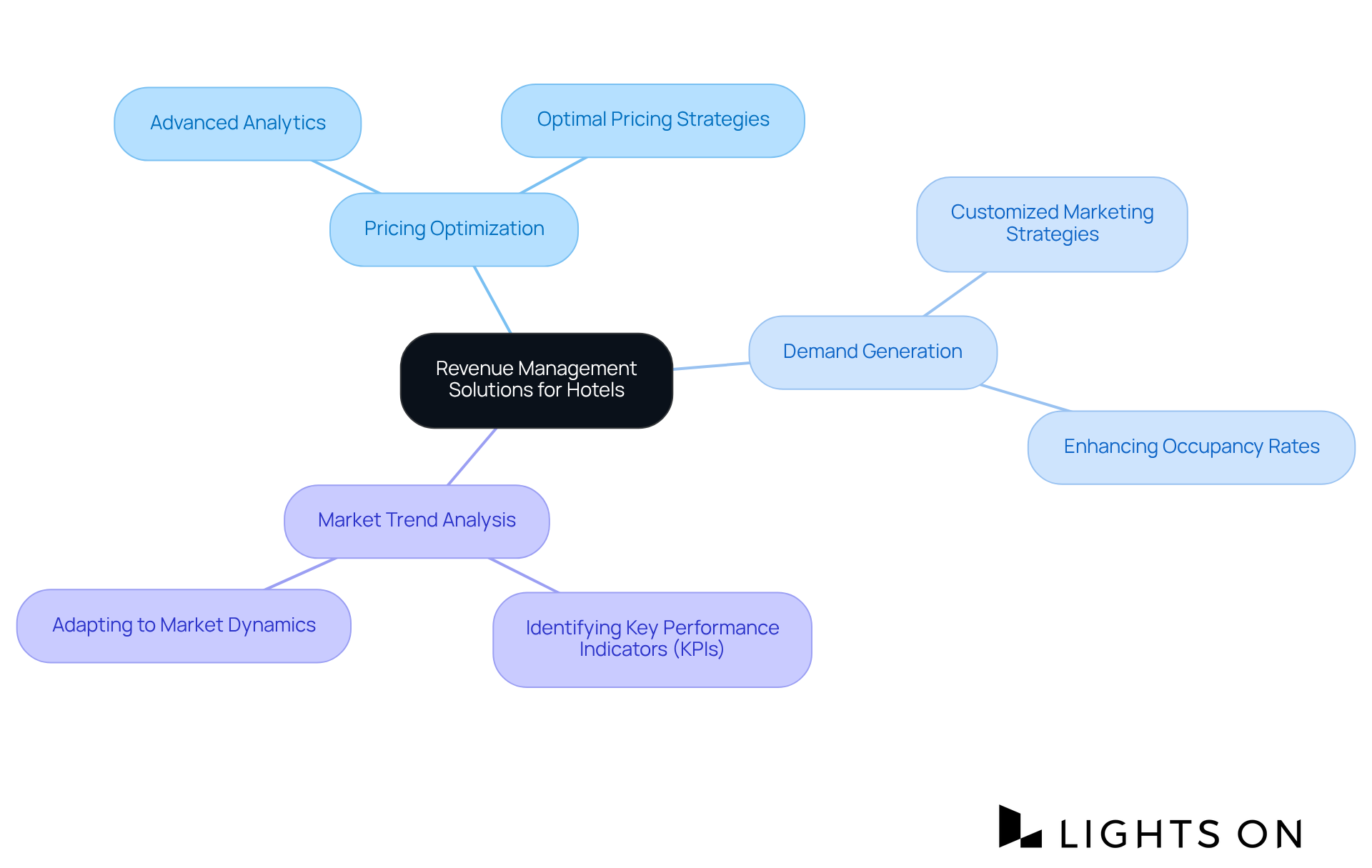
Dynamic Pricing: Adjust Rates Based on Market Demand
Dynamic pricing is a strategic approach that empowers hotels to adjust room rates in response to real-time market demand, competitor pricing, and occupancy levels. By leveraging sophisticated income management systems (RMS), establishments can effectively execute dynamic pricing strategies that capitalize on high-demand periods, thereby maximizing earnings. For instance, during peak seasons or significant events, accommodations can elevate prices to enhance profit margins while offering competitive rates during low-demand periods to attract visitors. This flexibility not only boosts profitability but also maintains appeal to potential clients, resulting in increased bookings and overall revenue hotel growth.
Key Strategies for Effective Dynamic Pricing:
Successful implementation of dynamic pricing in a revenue hotel necessitates a robust RMS that allows hoteliers to monitor market trends and adjust rates accordingly. By examining historical booking information and current occupancy rates, accommodations can make informed pricing choices that align with visitor expectations and market conditions. Expert insights indicate that dynamic pricing in a revenue hotel not only enhances income per available room (RevPAR) but also elevates guest satisfaction by providing customized pricing options in response to demand fluctuations.
Furthermore, accommodations that adopt dynamic pricing strategies can swiftly react to unforeseen market shifts, such as abrupt demand increases triggered by weather conditions or nearby attractions. This agility allows them to optimize occupancy rates and maximize opportunities for revenue hotel, ensuring they remain competitive in a rapidly evolving landscape. However, it is essential for accommodations to closely monitor competition to determine optimum pricing and avoid potential pitfalls, such as customer frustration or damage to brand perception due to fluctuating rates.
As the hospitality sector increasingly embraces technology, the advantages of dynamic pricing for a revenue hotel become more pronounced, positioning accommodations for sustained financial success. Precise forecasting is crucial to prevent overcharging or undercharging, ensuring that establishments can effectively utilize dynamic pricing as a key marketing strategy to meet market demands. By integrating these strategies with a robust RMS, revenue hotel establishments can enhance their operational efficiency and drive profitability.
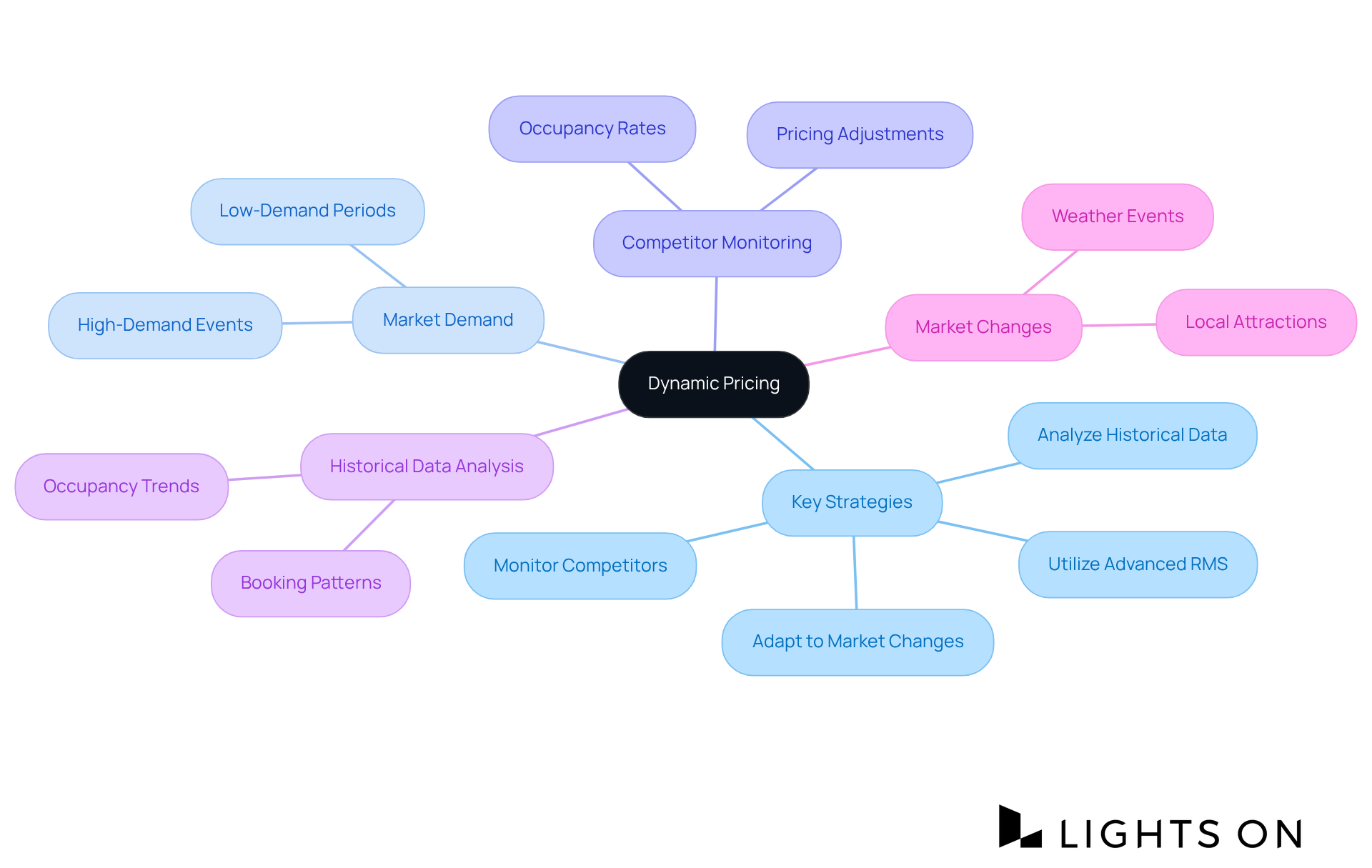
Channel management is essential for optimizing accommodation inventory distribution across various online travel agencies (OTAs), direct booking platforms, and additional channels. A robust channel management system enables accommodations to maintain rate parity, minimize overbookings, and enhance visibility across diverse customer segments. This strategic approach not only increases bookings at the revenue hotel but also significantly .
Furthermore, routine evaluation of channel performance is crucial, allowing property owners to identify the most lucrative channels and adjust their strategies accordingly. In fact, effective channel management can enhance occupancy rates even during low-demand periods, underscoring its importance in a competitive landscape where OTAs represent 39% of the U.S. online booking market.
By striking a balance between OTAs and direct bookings, establishments can optimize their revenue hotel potential while ensuring a superior guest experience.
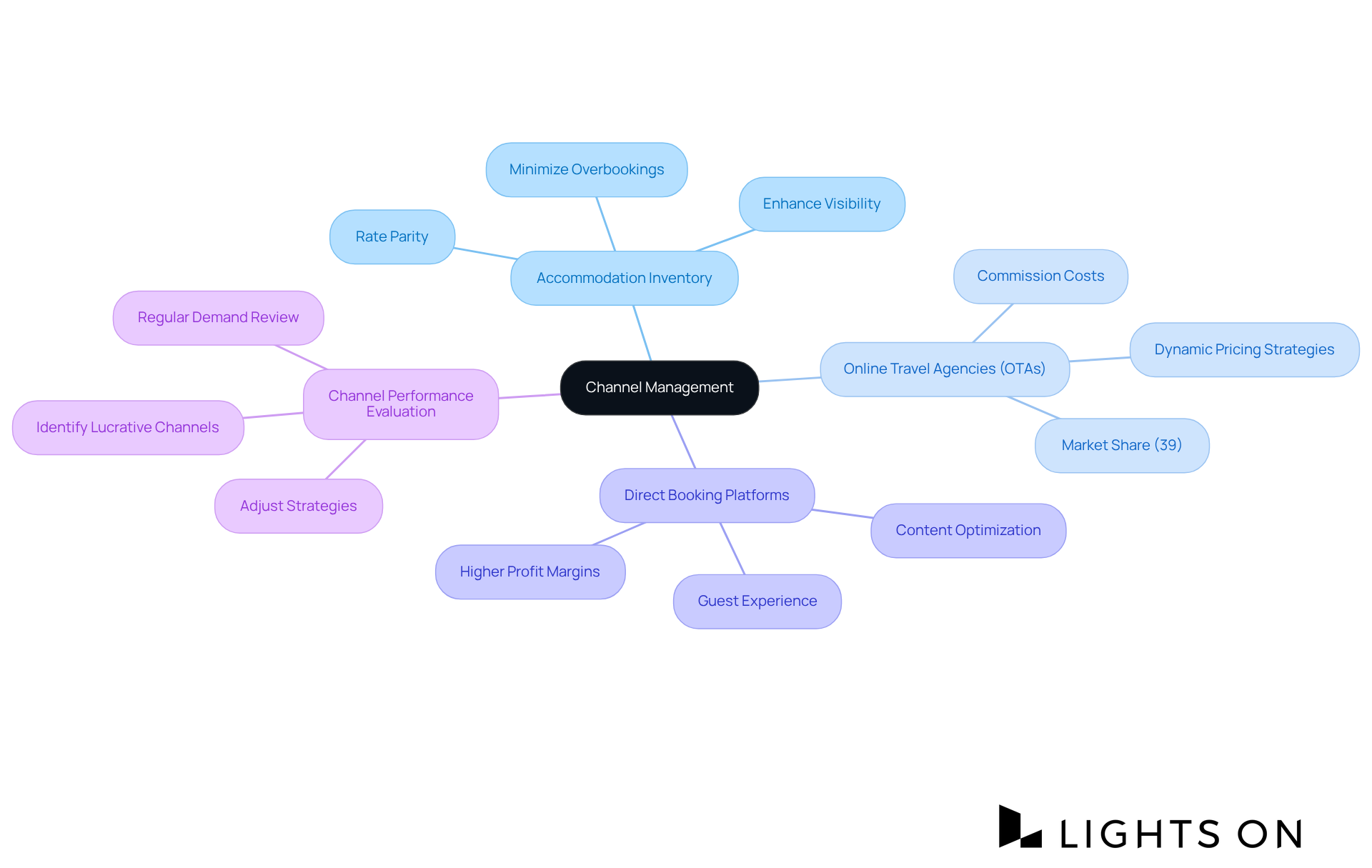
Data analytics serves as a formidable tool that empowers establishments to unveil critical insights into customer behavior, market trends, and operational performance. By thoroughly examining historical data alongside current market conditions, revenue hotel providers can make strategic decisions that refine their pricing, marketing, and inventory management.
Effective lodging promotion techniques, such as those advocated by Lights On, play a crucial role in this process, facilitating increased reservations and improved income management. Furthermore, advanced analytics tools not only discern patterns but also forecast demand, enabling establishments to optimize their profit strategies effectively.
This data-driven approach is increasingly essential for sustaining a competitive edge in the ever-evolving hospitality landscape. Industry analysts emphasize that is vital for maximizing profitability, as it allows establishments to tailor their offerings to meet shifting customer expectations.
As the hospitality sector continues to embrace technological advancements, the integration of data analytics into revenue hotel management practices will be pivotal for the success of innovative accommodations.
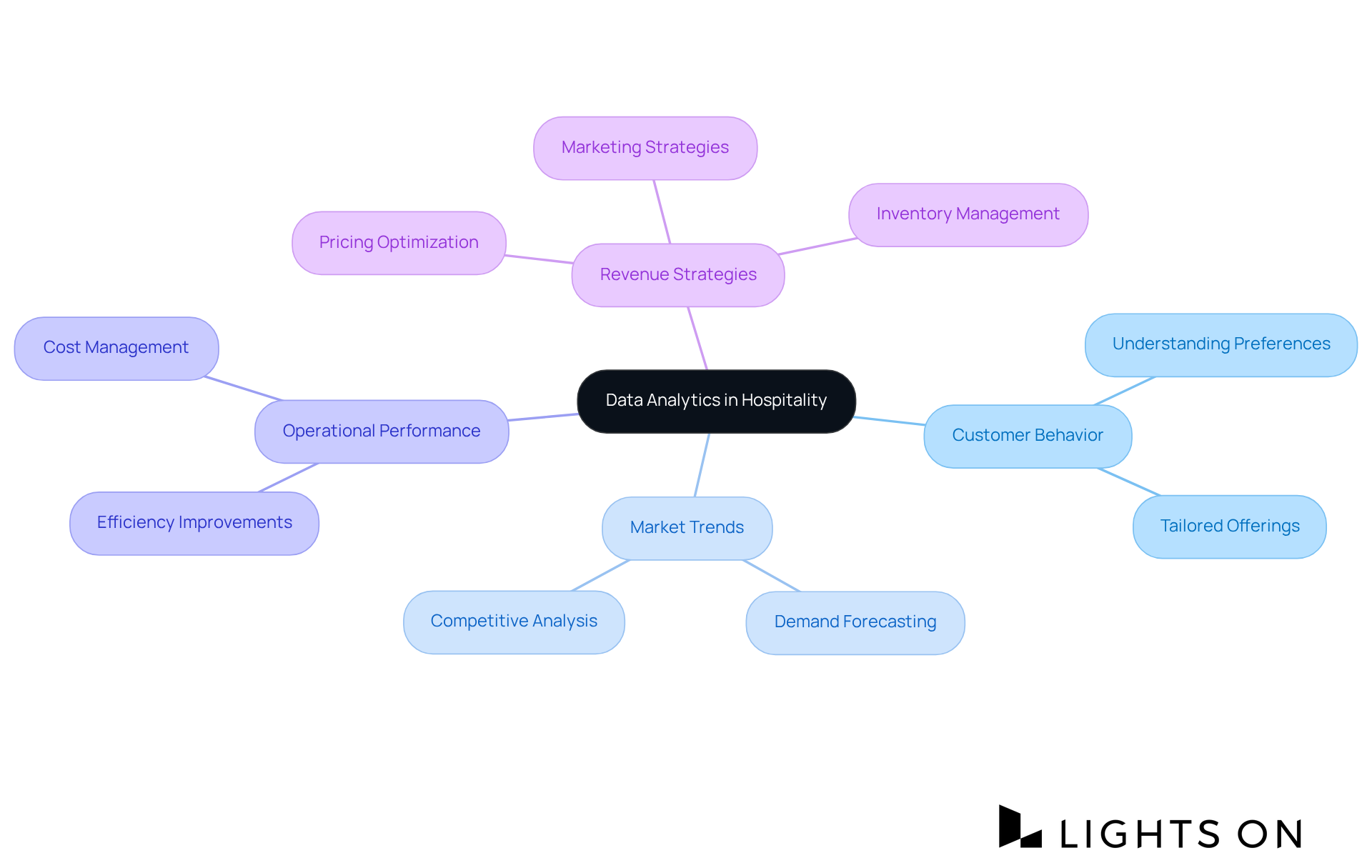
Market segmentation represents a strategic approach that categorizes the customer base into distinct groups based on demographics, preferences, and behaviors. By acquiring insights into the unique needs of each segment, hotels can tailor their offerings, marketing messages, and pricing strategies to meet visitor expectations. For instance, luxury travelers often seek premium services and personalized experiences, whereas budget-conscious visitors prioritize value and cost-effectiveness. This focused strategy not only enhances visitor satisfaction but also significantly boosts conversion rates and the revenue hotel growth.
Effective market segmentation strategies have proven successful in generating direct income. A case in point is Andronis Hotels, which achieved an impressive 600% year-over-year growth in direct income through customized email marketing campaigns that resonated with specific customer segments. Similarly, Mangia's Resorts generated €137,000 in direct revenue within the first month of launching targeted campaigns based on segmented guest data.
Insights from industry leaders underscore the necessity of customizing accommodation options for diverse customer demographics. Karen Stephens, Chief Marketing Officer at Revinate, highlights the transition from broad marketing strategies to meaningful connections facilitated by first-party data. This perspective is supported by hospitality experts advocating for the integration of advanced data analytics and AI tools to enhance segmentation efforts.
The impact of effective market segmentation on revenue hotel is profound. Revenue hotel strategies that understand their unique offerings and target specific audiences—such as families during summer vacations or business travelers during weekdays—can develop marketing campaigns that resonate deeply with these groups. This approach not only elevates visitor engagement but also fosters loyalty, ultimately leading to higher occupancy rates and increased average daily rates (ADR) for the revenue hotel.
To implement market segmentation effectively, owners should consider to identify and analyze their visitor segments. By disseminating segment information among staff, accommodations can enhance visitor service and create personalized experiences that cater to the specific needs of each group. Property Management Systems (PMS) play a crucial role in centralizing visitor information, enabling establishments to execute efficient segmentation strategies that align with their marketing objectives.
In conclusion, by harnessing data-driven insights to execute effective market segmentation strategies, revenue hotel establishments can refine their service offerings, address the diverse needs of their patrons, and optimize their financial potential while balancing privacy and personalization.
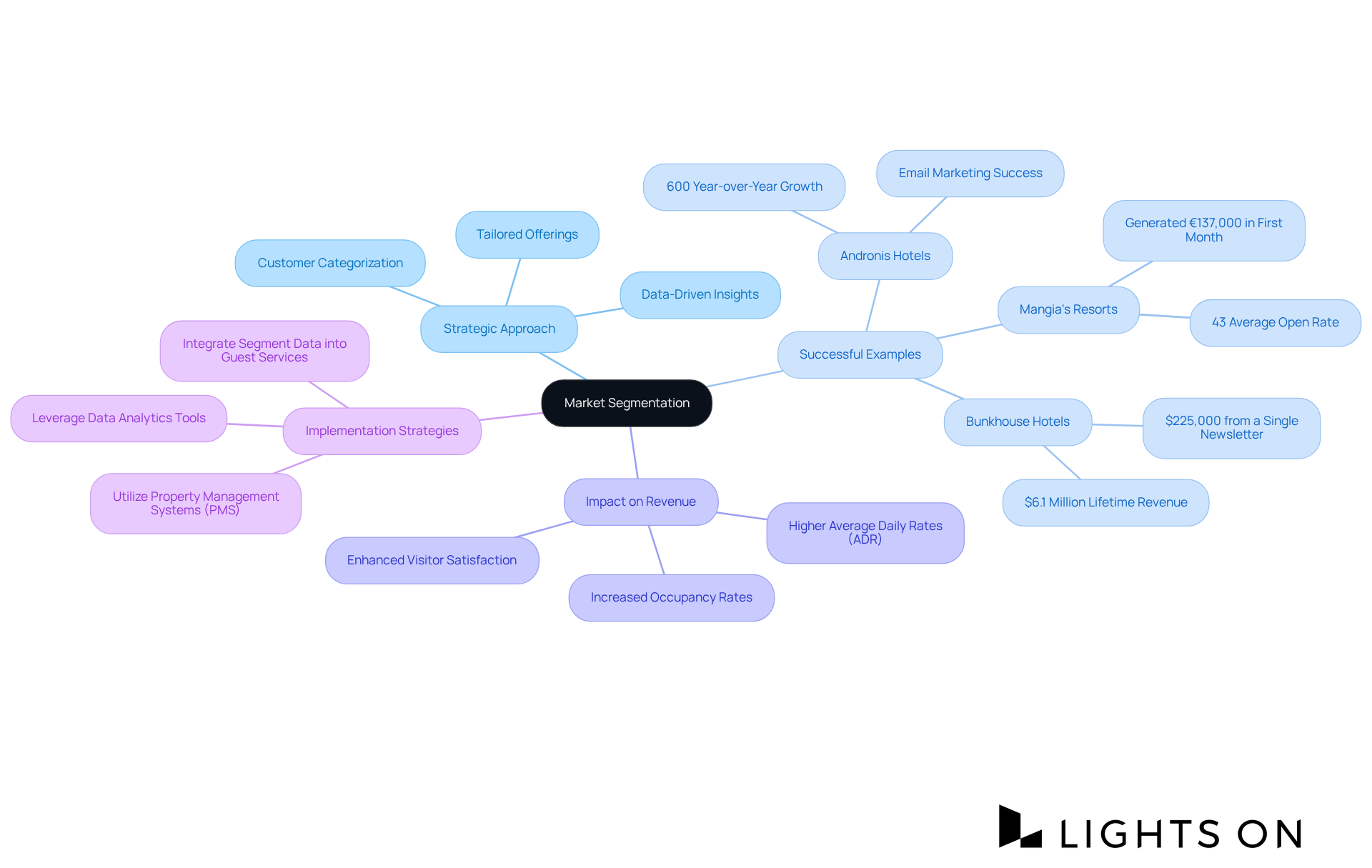
Ancillary income encompasses earnings generated from services beyond room sales, including dining, spa services, and event hosting. By broadening income sources, a revenue hotel can significantly improve profitability and create a more enriching visitor experience.
Implementing targeted strategies, such as offering package deals or exclusive promotions, encourages visitors to spend more during their stay. This not only increases income but also by offering a range of choices that improve their overall experience.
For instance, hotels that integrate dining credits into package deals often see increased spending in their restaurants, while on-site spas can attract both leisure and business travelers seeking relaxation. Furthermore, successful promotion of these supplementary services can result in enhanced conversion rates and greater profitability.
Properties that synchronize their sales, marketing, and financial management teams report more efficient campaigns. As industry leaders emphasize, diversifying revenue hotel streams is essential for long-term sustainability and resilience, particularly during low-demand periods when ancillary revenue can help maintain cash flow.
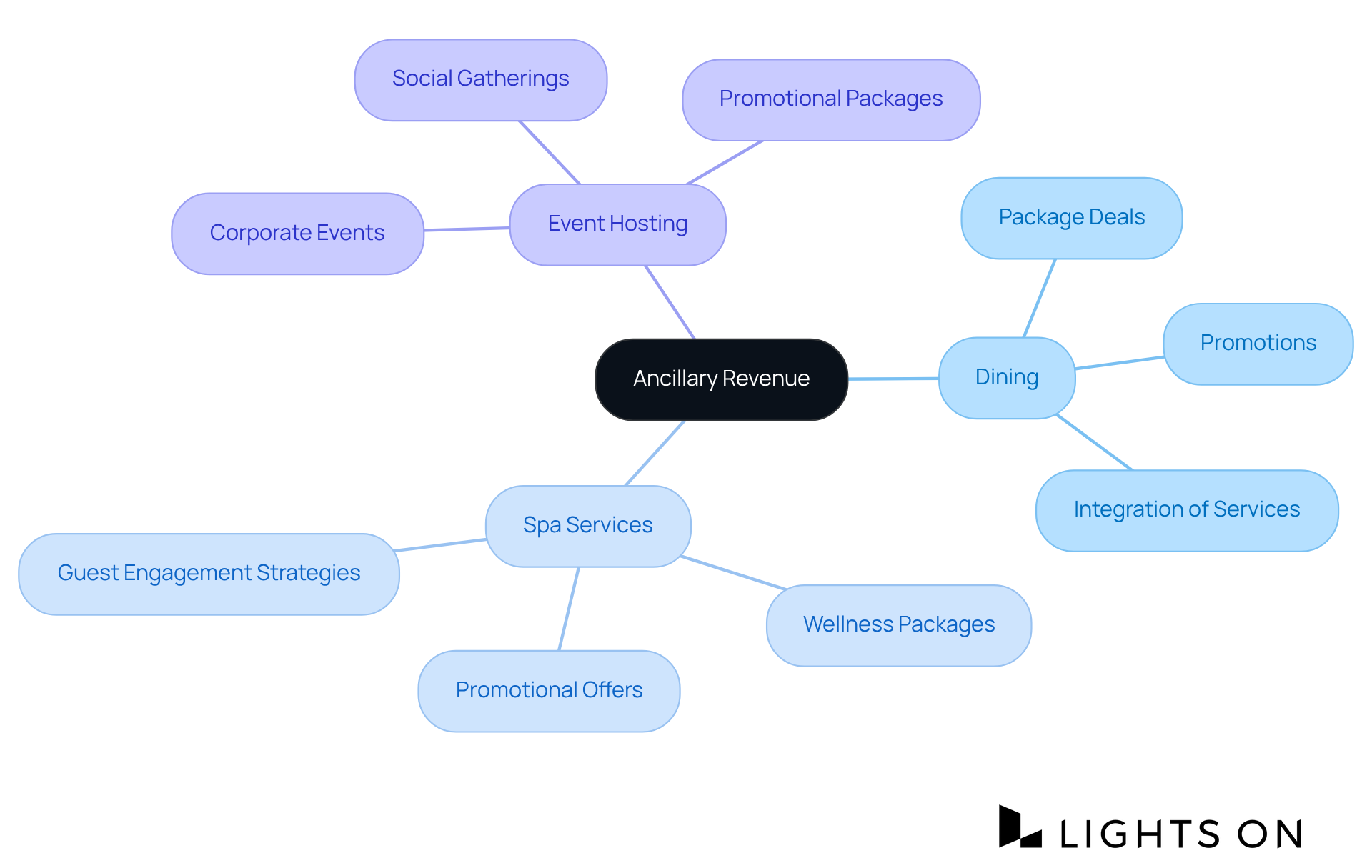
Establishing a loyalty program is an essential strategy for accommodations seeking to boost repeat business. By offering rewards, exclusive discounts, and personalized experiences, these establishments can effectively motivate visitors to return. Research indicates that loyalty programs enhance customer retention and encourage patrons to increase their spending during visits.
A well-structured loyalty program fosters a sense of belonging, transforming visitors into brand advocates who promote the establishment to others. This advocacy can lead to new bookings and significant . Effective loyalty initiatives within the hospitality sector demonstrate that when guests feel valued and recognized, their loyalty deepens, leading to increased revenue hotel profitability.
Furthermore, integrating loyalty programs into broader marketing strategies is crucial, showcasing how they can complement other efforts to maximize bookings and enhance revenue hotel operations.
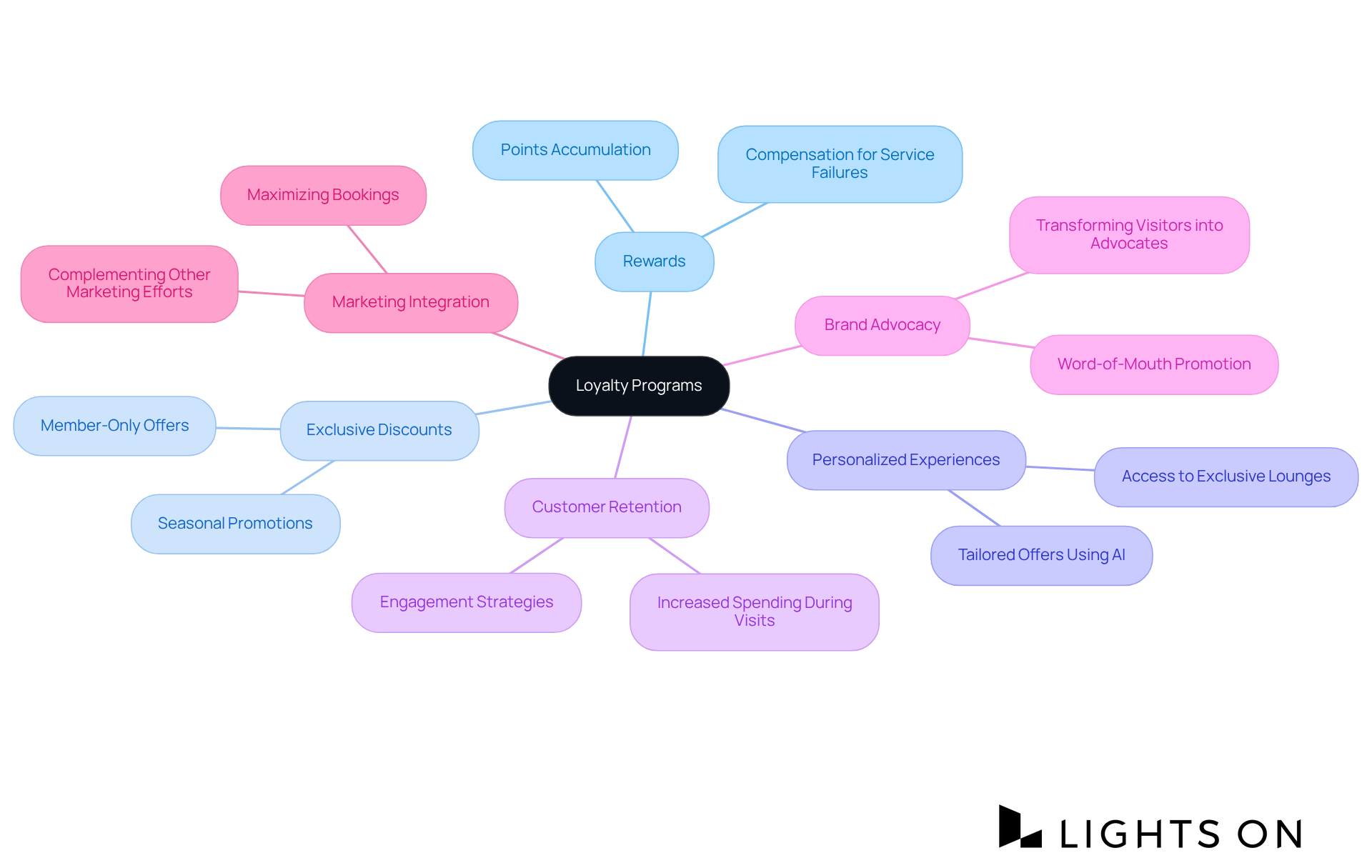
Forecasting is paramount for predicting future demand by meticulously analyzing historical data, market trends, and external influences. Accurate forecasts of occupancy levels and income potential empower revenue hotel establishments to make strategic decisions regarding pricing, staffing, and inventory management. This proactive approach not only but also prepares establishments for fluctuations in demand.
Furthermore, leveraging advanced forecasting tools, such as causal AI and machine learning, significantly enhances accuracy and yields critical insights for effective strategic planning. Industry analysts, including Amanda Hite, assert that precise forecasting is essential for adapting to market changes and seizing opportunities for revenue hotel, especially in a landscape characterized by economic uncertainty and shifting consumer behaviors.
Given the anticipated decline in RevPAR for 2025 and the projected occupancy rates, it is crucial for property owners to implement effective forecasting strategies. Practical measures include:
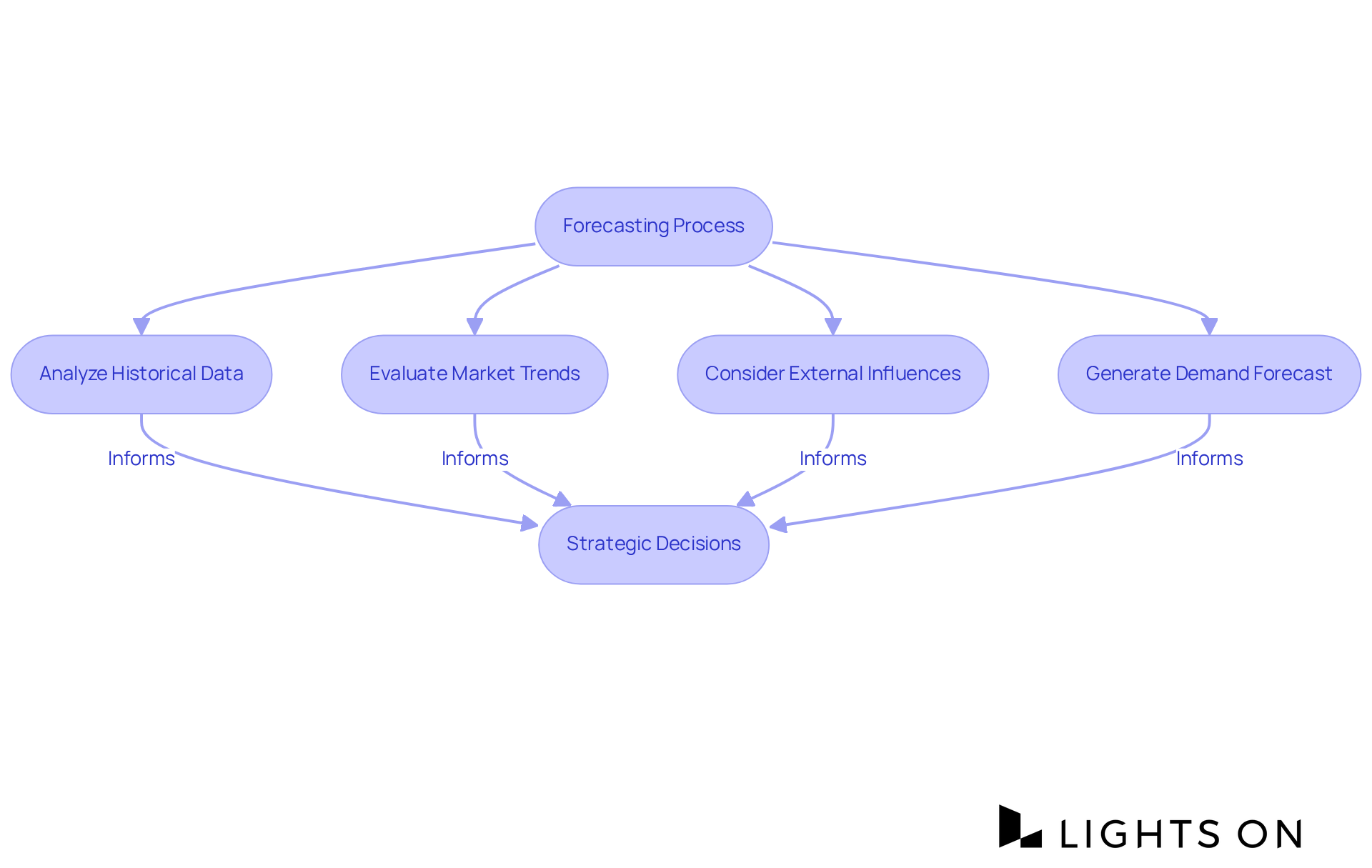
Upselling and cross-selling represent essential strategies for a revenue hotel aiming to elevate income per booking. By encouraging guests to purchase additional services or upgrades—such as room enhancements, dining packages, or spa treatments—revenue hotel can significantly boost their average revenue.
For example, a luxury beachfront resort that adopted an experience-focused upselling strategy witnessed its upselling revenue surge from $180,000 to $693,000, reflecting an impressive 285% increase. Training staff to effectively present these options is vital; can achieve sales that are three to five times greater than their less trained peers.
Furthermore, leveraging technology to display tailored offers enhances the guest experience and generates additional revenue. Automated email and SMS campaigns, timed to align with the guest journey, can produce conversion rates of 47-57% for pre-arrival upsells, underscoring the impact of timely, relevant offers.
The influence of upselling on revenue hotel is profound. Revenue hotel strategies that genuinely incorporate personalization into their upselling efforts not only realize greater profitability but also foster guest loyalty. For instance, 137 Pillars Hotels & Resorts generated lifetime revenue exceeding THB 28,000,000 through personalized upsell campaigns, highlighting the importance of customizing offers to individual guest preferences.
As hospitality leaders assert, effective upselling involves anticipating guest needs and enhancing their overall experience, positioning it as a strategic pillar for competitive advantage in the industry.
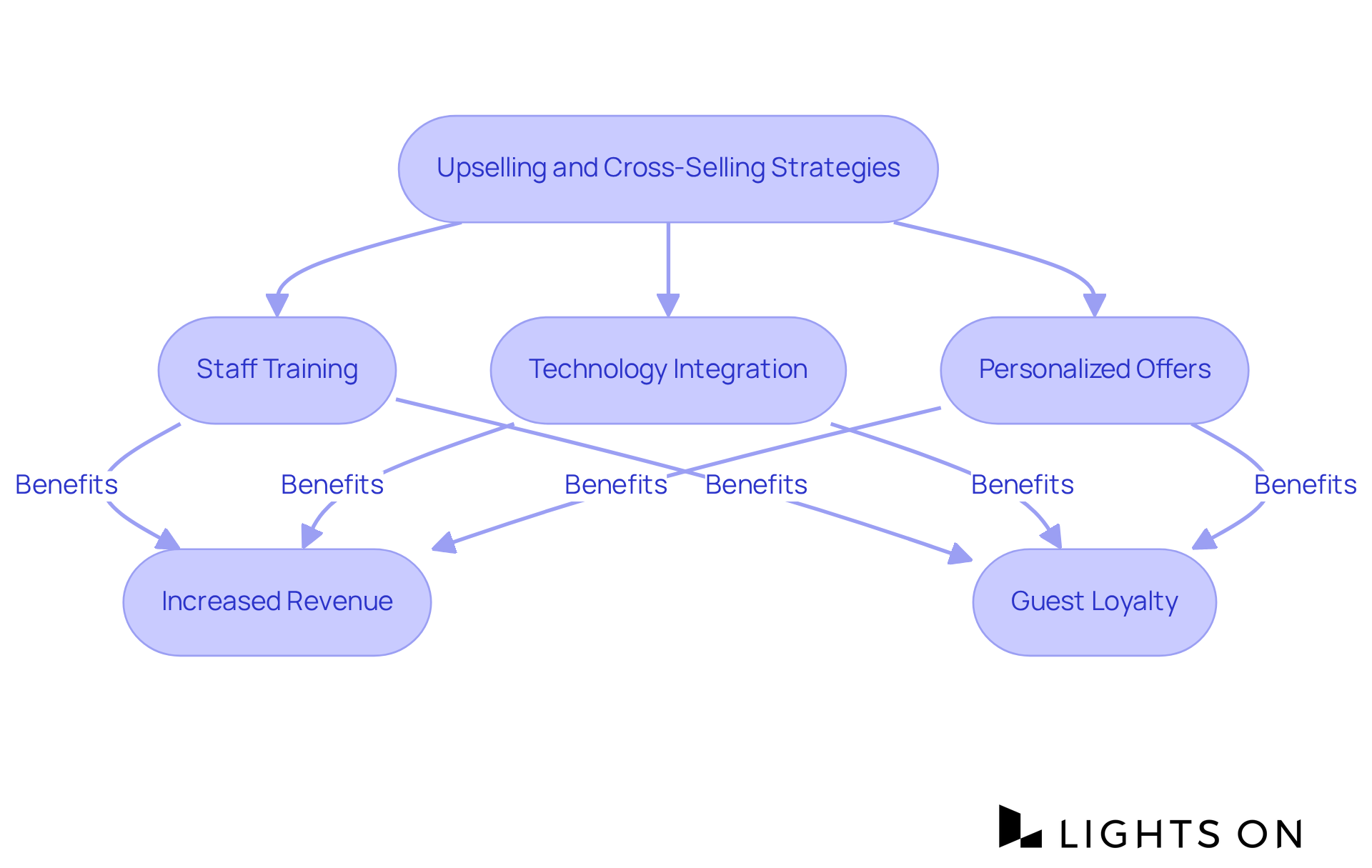
Carrying out routine performance evaluations is essential for establishments to assess the effectiveness of their pricing strategies and implement necessary adjustments. By analyzing key performance indicators (KPIs) such as:
property owners can pinpoint trends and areas ripe for enhancement. For instance, the ADR is calculated by dividing Total Room Revenue by the Number of Rooms Sold, providing valuable insights into pricing competitiveness. Furthermore, an RGI score exceeding 100 indicates that a hotel is generating more income per room than its competitors, underscoring successful financial management. This ongoing evaluation guarantees that remain competitive and aligned with market conditions, ultimately driving revenue hotel growth and enhancing overall financial performance.
Industry leaders, including Minal Mehta, stress that grasping the nuances of these metrics is vital for sustaining a competitive edge in the hospitality sector. Additionally, tracking the Average Rate Index (ARI) alongside other KPIs is crucial for a comprehensive understanding of pricing effectiveness, reinforcing the significance of strategic marketing efforts to boost bookings.
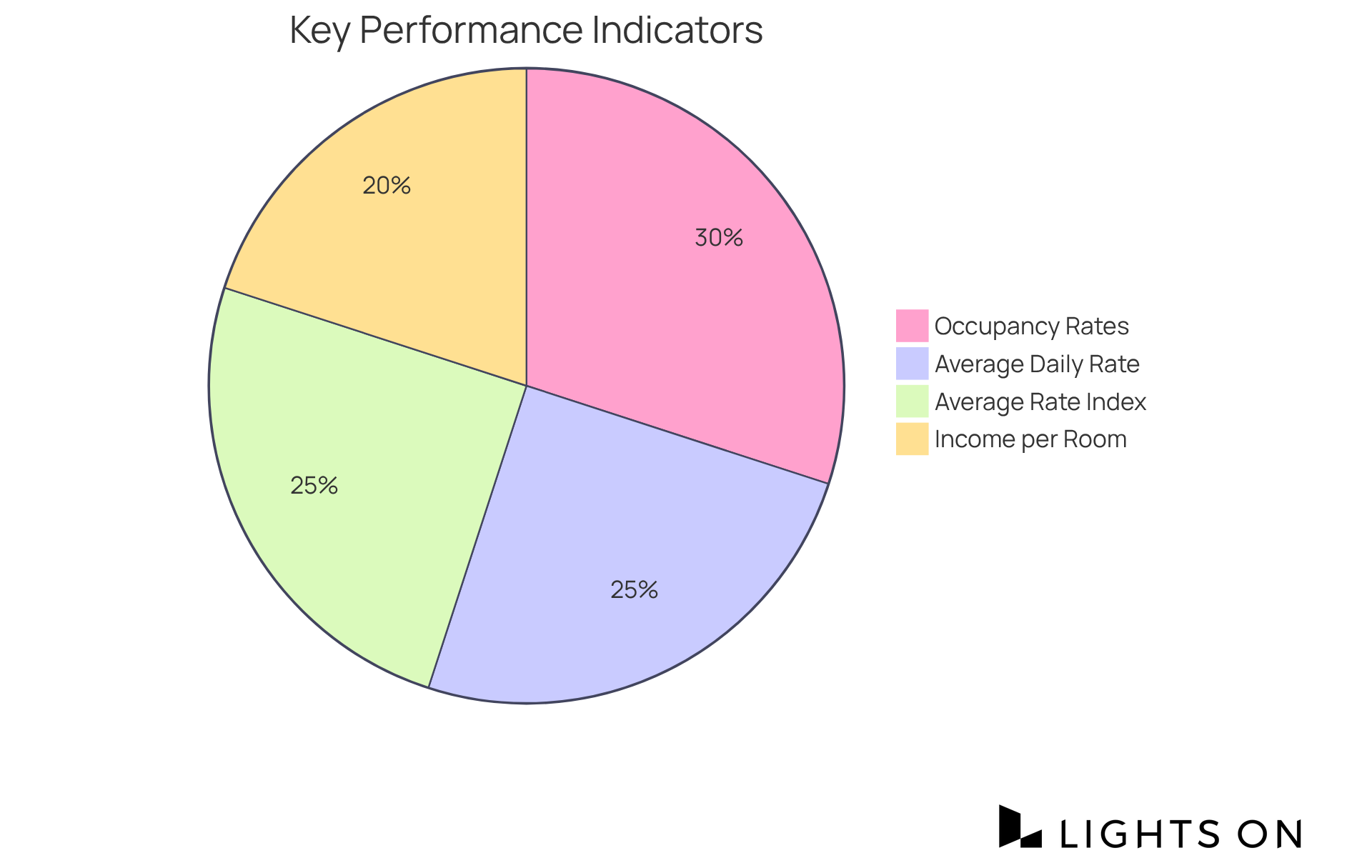
Maximizing hotel earnings in a competitive landscape necessitates a multifaceted approach that encompasses various revenue strategies. The insights presented underscore the significance of leveraging data-driven decision-making, dynamic pricing, and effective channel management to enhance financial performance. By employing these strategies, hotel owners can not only optimize occupancy and revenue but also ensure long-term sustainability in the ever-evolving hospitality sector.
Key strategies include:
Each of these strategies is vital in creating a comprehensive revenue management framework that positions hotels for success.
In light of these insights, it is essential for hotel owners to adopt a proactive approach to revenue management. By continuously evaluating performance metrics and adapting strategies to align with market conditions, accommodations can maximize their potential and enhance guest experiences. The hospitality industry is rapidly changing, and those who harness these proven revenue strategies will not only thrive but also set a benchmark for excellence in the field.
What services does Lights On provide for revenue hotel accommodations?
Lights On offers a comprehensive suite of financial management solutions, including pricing optimization, demand generation, and market trend analysis, aimed at enhancing financial performance for hotels.
How does Lights On assist property owners in the hospitality sector?
Lights On helps property owners execute specific income management initiatives and automate repetitive tasks, allowing them to focus on broader strategic planning.
What is dynamic pricing in the context of hotels?
Dynamic pricing is a strategy that allows hotels to adjust room rates based on real-time market demand, competitor pricing, and occupancy levels to maximize earnings during high-demand periods and attract visitors during low-demand periods.
What are key strategies for effective dynamic pricing?
Key strategies include utilizing advanced revenue management systems (RMS), analyzing historical data, monitoring competitors, and adapting to market changes.
Why is channel management important for hotels?
Channel management optimizes accommodation inventory distribution across various online travel agencies (OTAs) and direct booking platforms, helping maintain rate parity, minimize overbookings, and enhance visibility, which increases bookings and income.
How can effective channel management impact occupancy rates?
Routine evaluation of channel performance allows property owners to identify lucrative channels and adjust strategies, which can enhance occupancy rates even during low-demand periods.
What role does data play in revenue management for hotels?
High-quality data is essential for informed decision-making, allowing hotels to understand channel performance and market trends, which is critical for maintaining consistent bookings and maximizing revenue.
What challenges does the hospitality industry face that necessitate advanced management strategies?
The hospitality industry faces challenges such as rising costs and declining profits, making it imperative for revenue hotels to adopt advanced management strategies to ensure sustainable growth.
Transform your group booking strategies with Lights On and watch your occupancy soar.